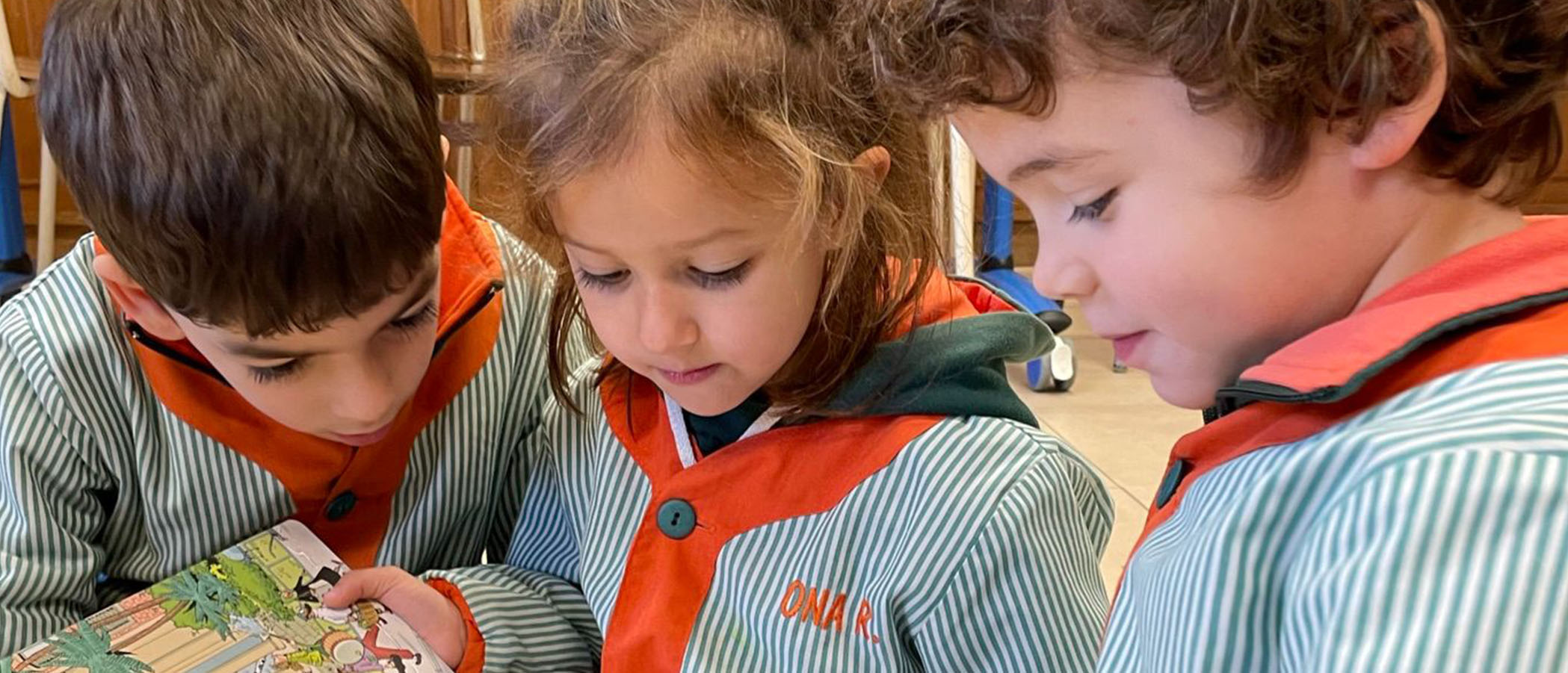
Childhood education
What do we do?
At this stage we seek to create a family atmosphere in which the child feels welcomed and loved, in order to acquire greater security and autonomy.
We work for the acquisition of good habits, both work and personal and relational, because we believe it is the basis for training children with interests, initiative and good self-esteem.
Throughout the Child Education Stage, we seek to make learning a pleasure, where students are the protagonists, where there is space for reasoning and where they learn to communicate what they think.
We want to collaborate in the training of autonomous, independent, happy and open-minded students. We prepare them to start the stage of Primary Education with enthusiasm, with resources and self-confidence.
How do we do it?
We are based on cooperative work and with a lot of space to manipulate and interact with the environment. We do this starting from play and direct observation of the boy and girl’s relationship with the school world.
We propose work projects in which, based on the previous knowledge that the boys and girls have, we discover together the different learnings that we want to achieve.
We create very flexible fun and experimentation corners, since we have the children’s interests in mind.
We leave space for participation and free expression and exploration.
Áreas Complementarias
Our students from E. Children, within their school hours, twenty-five teaching hours correspond to curricular learning and the rest is dedicated to Complementary Activities.
These activities that complement the Curriculum are:
- English Time
- Playing together (English)
- “Lady Tongue”
- religion
- Psychomotricity
- English Time
- Playing together (English)
- RoboTIC
- Religion
- Psychomotricity
- “Lady Tongue”
- English Time
- Playing together (English)
- RoboTIC
- Religion
- Psychomotricity
This activity is designed for kindergarten students to acquire naturally and very easily the learning of a third language (English).
Every day, for about 30 minutes, in small groups, the students listen, sing, play, express themselves and have fun with the games and activities proposed by our beloved “MOUSE”.
The complementary activity of English in E. Infantil takes place once a week…. The aim of these sessions is to put into practice, through cooperative games, all those concepts that are being worked on daily in the sessions from English time.
The methodology used is very similar in the three stages, although the learning is gradual in terms of learning to play cooperatively and/or in team games. On the other hand, there is also a gradual learning regarding the type of game.
Through the game, different aspects of oral and written comprehension are worked on and, in addition, oral expression.
This complementary activity is based on the concept we have in our school of ICT. We understand computers as another tool for the students’ daily work, that is to say, we work on mathematics, languages, art,… with the help of computer programs.
Children’s Education students work through games that allow them to acquire mastery of the mouse and the loss of fear in front of a tablet.
Students learn and practice with the tablet in an interdisciplinary way.
During this weekly hour, students also experience robotics in cooperative groups, where they can start programming and designing with Kubo, an educational robot designed for children to learn to program without the need to use screens, until and all before they know how to read and write. Through practical experiences close to their reality, they will develop computational thinking and apply it to programming.
This workshop was born with the aim of improving the oral expression of our students in the Early Childhood Education stage. We program activities in order to acquire good breathing, articulatory, postural and gestural habits.
“La Senyora Léngua” is designed as a game where different activities are carried out, such as articulating the sounds of animals, making bubbles, blowing up balloons, discovering the sounds and noises of our environment, exercises with the tongue, hissing lips … all of them with the purpose of exercising the organs and articulatory muscles necessary to speak, eat and breathe correctly.
We encourage good speech and language practices and correct those that are not, in order to acquire healthy habits, in terms of speech and hygiene. Nasal breathing is also worked on, where you learn to blow correctly, with intensity and regularity.
One of the other strong points of these sessions are hygiene habits, such as how to sneeze properly.
It is a complementary activity aimed at Early Childhood Education where the main objective is to make the mouth, tongue and lips work and thus exercise them and become aware of them.
Evaluation
In this cycle, evaluation is defined as the process of observation and systematic analysis of the teaching and learning process.
The evaluation is understood as an integrated element in the teaching and learning process and, therefore, it must enable:
- Knowledge of the individual initial conditions of each child,
- Knowledge of the progress made by each child in the development of their abilities.
- The degree of achievement of the established objectives.
For which, the evaluation of the learning process of the students is carried out in three phases:
- Initial evaluation.
- Continuous or Formative Evaluation.
- Final or Summative Evaluation.
Dates of delivery of the reports
- First evaluation: End of January
- Second evaluation: End of June
